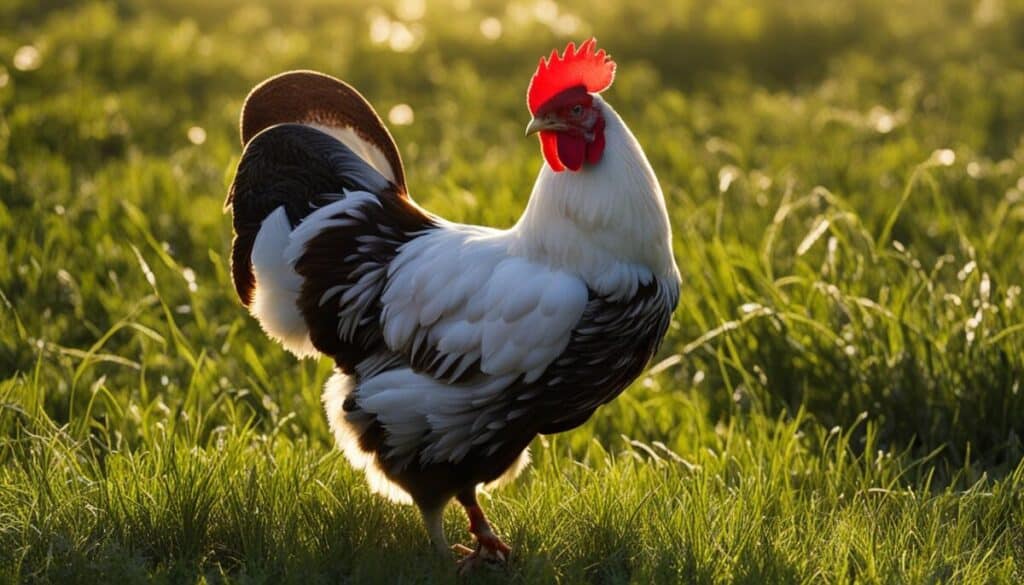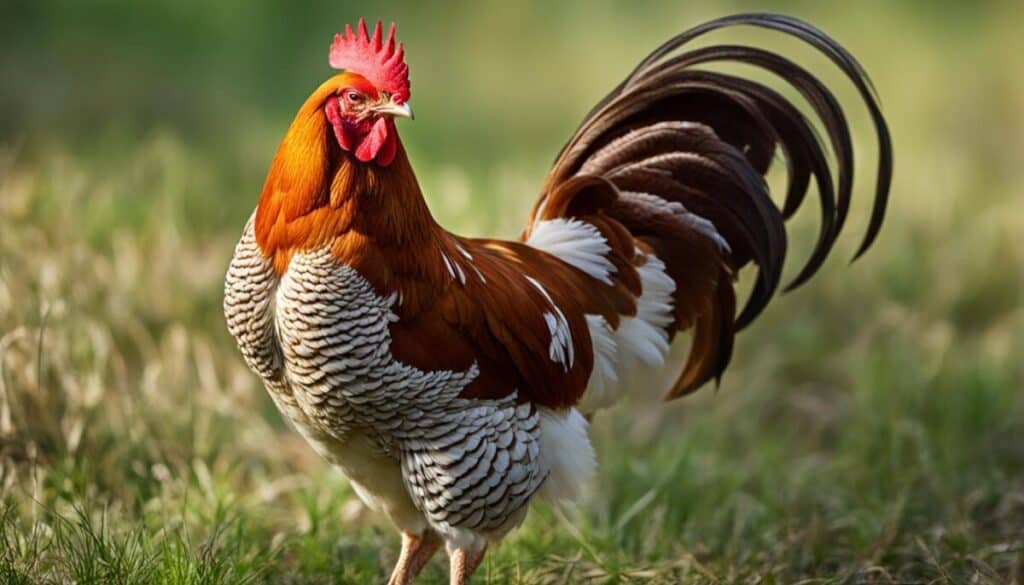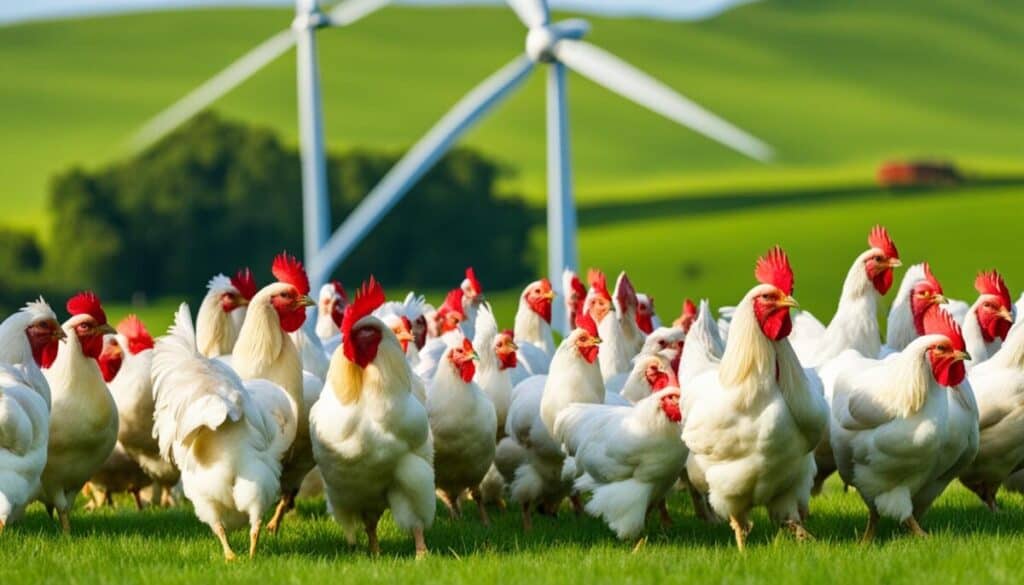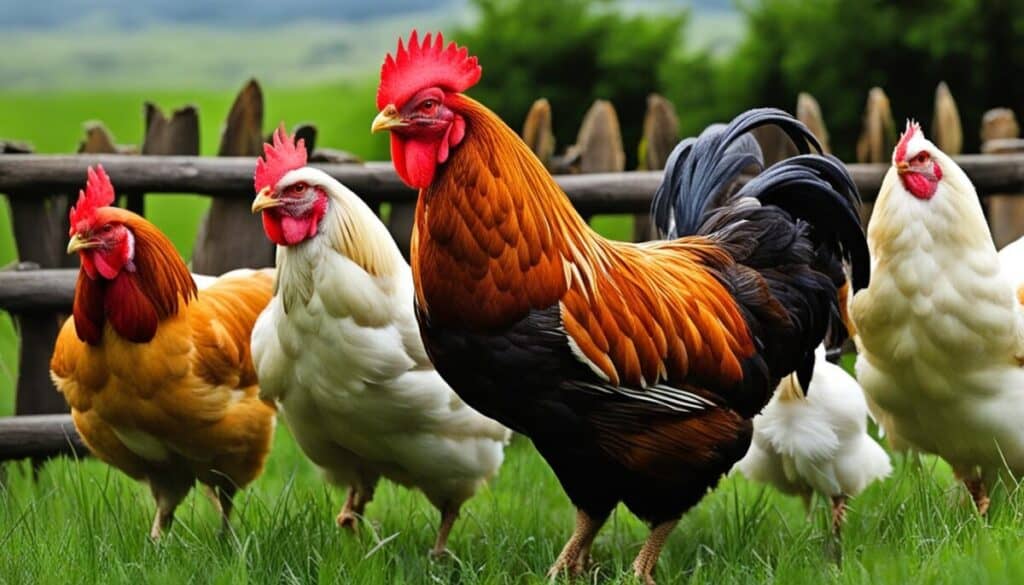Welcome to our comprehensive guide on the Redcap chicken breed. If you are a poultry farmer or a backyard chicken enthusiast, or just love chicken breeds, you will find this guide informative and interesting. In this guide, we will explore the unique characteristics of Redcap chickens, their care requirements, and why they are a popular choice for backyard chicken keepers and poultry farmers alike.
The Redcap chicken breed is a heritage chicken breed that originated in England. They are well-known for their distinctive physical attributes, docile temperament, and adaptability to various farming practices. Whether you are a novice poultry keeper or an experienced poultry farmer, you can benefit from learning more about this remarkable breed.
Key Takeaways:
- Redcap chickens are a heritage breed that originated in England
- They have unique physical characteristics, including an upright comb and distinct feather coloration
- Redcap chickens have a docile and friendly temperament, making them a popular choice for backyard flocks
- They are adaptable to various farming practices, including free-range and organic farming
- Redcap chickens are suitable for both egg production and meat quality, making them a fantastic choice for poultry enthusiasts.
What are Redcap Chickens?
Redcap chickens are a fascinating breed that originated in England and have been around for centuries. They are classified as heritage chicken breeds and are highly prized by poultry enthusiasts for their gorgeous appearance and friendly temperament. As their name suggests, Redcaps have a distinctive red hat-like comb that sets them apart from other chicken breeds. They are also known for their beautiful feathering and unique body shape.
Redcap chickens are a medium-sized breed that is suitable for both egg and meat production. They are popular among backyard chicken keepers as well as sustainable and organic farmers. These birds are known for their resilience and adaptability, making them an essential addition to any flock.
When it comes to their place in the world of poultry farming, Redcaps are a fantastic choice due to their easygoing nature and versatility. They can thrive in both free-range and enclosed environments and are known to be excellent foragers, making them a sustainable breed for organic farming practices.
Appearance of Redcap Chickens
Redcap chickens are an eye-catching breed, with unique physical characteristics that distinguish them from other chicken breeds. Their most notable feature is their upright comb, which resembles a small hat, and is typically bright red in color, making it an unmistakable trait.
Redcaps have bright, alert eyes, and their beaks and legs are typically a vibrant yellow color. Their feather coloration can vary, with some birds having mostly black feathers with red on the shoulders, while others have a more balanced distribution of red and black feathers.
On average, Redcap chickens weigh between 4-6 pounds and are classified as a medium-sized breed. They have a sleek body shape, with a long back and a slightly curved tail. Their wings are short and rest close to their bodies, making them less suited for activities like sustained flight but ideal for free-range environments.
Redcap chickens are ideally suited for free-range environments as they have superb foraging skills. Due to their physical characteristics and natural instincts, they can cover a lot of ground, moving quickly and efficiently while hunting for food. They are also excellent at avoiding potential predators, making them an ideal choice for backyard and farm chicken flocks alike.
Temperament and Behavior of Redcap Chickens
Redcap chickens are well-known for their gentle and sociable nature, making them an excellent choice for backyard flocks. These birds are adaptable and thrive when given the opportunity to free-range and exhibit their natural behaviors. They are a popular choice for those looking to raise organic and free-range chickens due to their ability to forage and find their own food.
Temperament
The peaceful and friendly temperament of Redcap chickens makes them a joy to have around. They are sociable and enjoy the company of humans and other chickens alike. These birds are suitable for novice chicken keepers because they are easy to handle and rarely show aggression. They can coexist with other breeds, making them a valuable addition to a mixed flock.
Sociability
Redcap chickens are a sociable breed, and they enjoy being around their owners. They are known for following their keepers around the yard and will readily approach for a gentle pat or a treat. Due to their docile nature, they are a popular choice for families with children or those seeking a friendly pet. They are also used as therapeutic animals in some settings, such as nursing homes or schools.
Behavior Patterns
Redcap chickens are active and curious birds, often seen exploring their surroundings. They enjoy free-ranging and are skilled foragers, adept at finding food and scratching for insects. They are adaptable to different environments, making them suitable for both urban and rural settings. These birds are also excellent egg producers, laying up to five eggs per week.
| Behavior | Description |
|---|---|
| Foraging | Redcap chickens are skilled foragers, enjoying exploring and finding their own food. |
| Laying eggs | These birds are excellent egg layers, producing up to five eggs per week. |
| Docile nature | Redcap chickens have a gentle temperament, making them easy to handle and suitable for families with children. |
| Sociable | These birds enjoy being around humans and other chickens, making them a valuable addition to mixed flocks. |
| Adaptable | Redcap chickens thrive in different environments, making them suitable for urban and rural settings. |
“Redcap chickens are a pleasure to have around. They are gentle, social, and curious birds that enjoy exploring their surroundings and scratching for food.”
Caring for Redcap Chickens
Redcap chickens are hardy birds that adapt well to various climates. However, to keep them healthy and happy, proper care is essential.
Housing Requirements
It’s crucial to provide your Redcap chickens with a secure and suitable living environment. Their coop should be well-ventilated, spacious, and free from drafts, with ample roosting space, nest boxes and natural light to encourage their egg-laying and normal activity. The coop area, approximating to 3 sq. feet per bird, must be dry, clean, and well-bedded, straw or wood chips being best. Always ensure their bedding is changed regularly to maintain good hygiene.
Feeding Needs
Redcap chickens are omnivores and require a balanced, nutritious diet. You can feed them with a commercial chicken feed (preferably organic) or supplement it with grains, seeds, and fresh fruits and vegetables. Moreover, it’s vital to ensure access to clean water at all times. Access to natural organic fodder systems is ideal with most food intake is naturally obtained and more sustainable.
Health Considerations
Keeping your Redcap chickens healthy should be one of your top priorities. Regular deworming, vaccination, and a close eye on their behavior and physical changes can prevent any disease outbreaks or illness. Clean bedding, properly ventilated housing, nutritional diets, and access to clean water are essential in maintaining healthy birds.
General Care Guideline
Redcap chickens do not require high maintenance but it is important to regularly check their overall health. Spend some quality time with them, socializing and monitoring their behavior while also keeping their coop clean and free from predators. Early detection of any issue can help keep the flock healthy and minimize harm.
Redcap Chickens in Poultry Farming
As more farmers embrace sustainable and organic farming practices, Redcap chickens have become a favored choice due to their unique appearance, docile nature, and desirable meat quality. Redcap chickens can thrive in free-range environments, making them an excellent addition to organic and free-range poultry farms.
Redcap chickens are popular for poultry farming due to their moderate size. Mature birds typically weigh around six pounds, making them suitable for backyard coops and small-scale farming operations. These chickens have excellent meat quality and are often raised for their flavorful and nutritious meat.
Furthermore, Redcap chickens have notable egg-laying capabilities and can produce up to 250 eggs per year, making them an excellent investment for egg production farms.
Redcap chickens have great adaptability to various climates due to their hardiness and are resistant to many common poultry ailments, making them low-maintenance and cost-effective. They also have an attractive appearance, which some commercial poultry farmers exploit to differentiate their products in the market.
The Advantages of Redcap Chicken Breeds in Poultry Farming
| Advantages | Details |
|---|---|
| Desirable meat quality | Redcap chickens offer flavorful and nutritious meat |
| Egg-laying capabilities | Redcap chickens can produce up to 250 eggs per year, making them an excellent investment for egg production farms |
| Adaptability to various climates | Redcap chickens are hardy and resistant to many common poultry ailments, making them low-maintenance and cost-effective |
| Attractive appearance | Redcap chickens offer an appealing appearance, which can facilitate product differentiation in the commercial market |
Overall, Redcap chickens are an excellent choice for sustainable and organic poultry farming, offering a balance of beauty and functionality. Farmers seeking to diversify their product offerings while maintaining profitability will find these birds an excellent investment. With proper care and attention, Redcap chickens will provide years of enjoyment, delicious meat, and plentiful eggs.
Breeding and Hatchery Considerations for Redcap Chickens
Redcap chickens are a unique and desirable heritage breed that can be an excellent addition to your backyard flock or poultry farm. Breeding these chickens might seem daunting at first, but with the right information, it can be a rewarding experience. Here are some insights into breeding and hatchery considerations for Redcap chickens:
Selecting Breeding Stock
The first step in breeding Redcap chickens is to select the right breeding stock. Choose birds that conform to breed standards, and avoid those that exhibit any genetic defects or health issues. It’s best to choose birds with a proven track record of producing healthy offspring with desirable traits. Keep in mind that breeding closely related birds can lead to genetic defects, so avoid this practice.
Incubation Methods
After selecting the breeding stock, it’s time to incubate the eggs. Redcap chickens have specific requirements when it comes to incubation temperature and humidity levels. The eggs should be incubated at a temperature of around 99.5°F (37.5°C) and a humidity level of around 55%. It’s important to monitor temperature and humidity levels closely and make adjustments as needed to ensure optimal hatch rates.
Maintaining Genetic Purity
Maintaining genetic purity is essential when breeding Redcap chickens. Breeding birds that are not purebred can lead to offspring with undesirable traits and health issues. It’s crucial to keep detailed records of breeding activities and monitor the breeding process closely to ensure that only purebred Redcap chickens are produced.
| Breeding Considerations | Hatchery Considerations |
|---|---|
| Choose birds that conform to breed standards. | Monitor temperature and humidity levels closely during incubation. |
| Avoid breeding closely related birds. | Maintain genetic purity by keeping detailed breeding records. |
| Select birds with a proven track record of producing healthy offspring with desirable traits. | Provide a suitable hatching environment to ensure optimal hatch rates. |
With the right knowledge and care, breeding Redcap chickens can be a fulfilling and enjoyable experience. Whether you’re interested in expanding your backyard flock or starting a Redcap breeding program, understanding these breeding and hatchery considerations is essential.
Advantages of Choosing Redcap Chickens for Your Flock
Redcap chickens are an excellent choice for any backyard flock or poultry farm. They offer several advantages, making them a preferred breed among chicken enthusiasts. Let’s explore some of the benefits of selecting Redcap chickens for your flock:
Adaptability to Various Climates
Redcap chickens are a hardy breed that can adapt to a wide range of climates, making them an ideal choice for backyard flocks and poultry farming in different regions. Whether you live in a hot and humid climate or a cold and harsh environment, Redcaps can thrive and produce healthy eggs and succulent meat.
Suitability for Both Egg Production and Meat Quality
Redcap chickens are dual-purpose birds, meaning they are great for both egg and meat production. They are excellent layers and can produce up to 280 eggs per year. In addition, their meat is juicy and flavorful, making them a popular choice for meat lovers and sustainable farming practices.
Ability to Forage and Thrive in Free-Range Environments
Redcap chickens are natural foragers and have a strong instinct to hunt for their food. They are excellent at finding and consuming insects, seeds, and other natural resources, which not only contributes to their overall health but also reduces the cost of feeding them. Additionally, Redcaps thrive in free-range environments and can cover vast areas, making them a great choice for those who want their chickens to enjoy their natural behaviors.
As you can see, Redcap chickens have numerous advantages that make them an ideal choice for both backyard chicken keepers and poultry farmers. They are adaptable, excellent layers, and meat producers, and natural foragers. Take advantage of the unique characteristics and benefits of Redcap chickens and see why they are rapidly gaining popularity in the world of sustainable and organic poultry farming.
Conclusion
In conclusion, the Redcap chicken breed is a fantastic addition to any backyard flock or sustainable farming operation. Their unique appearance, friendly temperament, and adaptability to various climates and farming practices make them a popular choice among chicken enthusiasts. By understanding their care requirements and characteristics, you can provide the best possible environment for your Redcap chickens to thrive and produce high-quality eggs and meat.
As one of the heritage chicken breeds, Redcaps offer a delightful balance of beauty and functionality, making them an excellent choice for those interested in preserving rare and unique chicken breeds. As you embark on your journey of sustainable farming and chicken keeping, consider adding Redcap chickens to your flock and reaping the advantages they offer.
Thank you for reading this comprehensive guide on the Redcap chicken breed. We hope this article has provided valuable insights into what makes these chickens so special and why they are worth considering for your farming endeavors. Stay tuned for more informative and engaging content on chicken breeds, sustainable farming, and homesteading.
FAQ
What are the care requirements for Redcap chickens?
Redcap chickens require a suitable living environment, including a secure coop and a spacious outdoor area for foraging. Provide them with a balanced diet consisting of high-quality chicken feed and plenty of fresh water. Regular health checks and preventative measures against common poultry diseases are also crucial.
Can Redcap chickens be kept as pets?
Yes, Redcap chickens can make wonderful pets. They have a friendly and docile nature, which makes them enjoyable to interact with. However, keep in mind that they do require proper care, including a suitable living space and regular attention to their health and well-being.
Do Redcap chickens lay a good quantity of eggs?
Redcap chickens are moderate layers, typically producing around 150 to 200 large, brown eggs per year. While they may not be the most prolific layers, their eggs are known for their excellent taste and quality.
Are Redcap chickens suitable for free-range farming?
Absolutely! Redcap chickens thrive in free-range environments where they can exhibit their natural behaviors, forage for food, and enjoy ample space. Their ability to adapt to various climates and their excellent foraging skills make them an ideal choice for free-range and sustainable farming practices.
Where can I purchase Redcap chickens?
Redcap chickens can be purchased from reputable hatcheries or breeders specializing in heritage chicken breeds. It’s essential to do thorough research and ensure that the source is reliable and reputable to ensure the health and genetic purity of the birds.
Are Redcap chickens suitable for small backyard flocks?
Yes, Redcap chickens are well-suited for small backyard flocks. They are docile, easy to handle, and their beautiful appearance adds aesthetic value to the flock. However, remember to provide them with adequate space, proper care, and attention to ensure their well-being and happiness.
What is the average lifespan of a Redcap chicken?
On average, Redcap chickens have a lifespan of 5 to 8 years. However, with proper care, including a balanced diet, regular health checks, and protection from predators, they can live longer and continue to be productive members of your flock.
Can Redcap chickens tolerate cold climates?
Yes, Redcap chickens are known for their cold hardiness and can tolerate colder climates. Their dense feathering and smaller comb help to protect them from the cold. However, it’s still essential to provide them with appropriate shelter and protection from extreme weather conditions.




